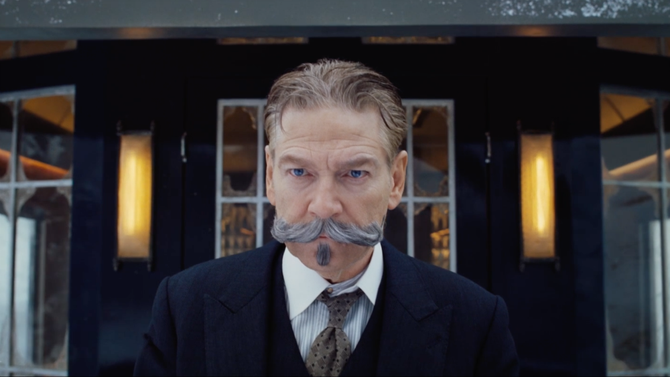Everything you need to know about Murder on the Orient Express, Kenneth Branagh's new widescreen take on the old Agatha Christie whodunnit, can be deduced from its prologue: many criticisms can be and have been levelled at the film, but you can't say it isn't upfront about declaring its intent. We join Hercule Poirot (played by Branagh himself) in Jerusalem, cradle of civilisation, making a huge helter-skeltering fuss about the delivery of his hard-boiled eggs, making friends with a winsome local child, and then making his way down, stepping in camel poo not once but twice for balance, to the site of the Wailing Wall, where in front of a swelling crowd of pilgrims and gawpers, he briskly solves a crime that, as the detective himself notes, sounds very much like the beginnings of a bad joke. (It brings together a rabbi, a priest and an imam.) Needless to say, this isn't Christie's joke, nor really Christie's idea of Poirot; instead, it establishes Branagh's conception of the sleuth as an irresistible populist, a performer of genius, a colossal show-off. Rather than the neatly waxed moustache David Suchet adopted for the role on TV, Branagh proudly unfurls what looks like a distant relation of Digby, the Biggest Dog in the World across his top lip; it's just possible he shot the film in 65mm specifically to squeeze in its every last bristle.
My initial suspicion that this Murder would play rather better in international markets than it would in the UK, where Suchet's introspective and solitary Poirot has held sway for several decades, has been confounded by its domestic box-office, so perhaps its success can be attributed to Branagh's decision to reach for the stars - that he's pulled off the closest thing to panto we might witness inside a Picturehouse this festive season. The 2017 Murder is, unarguably, a logistical triumph, coupling together the schedules of performers spanning diverse demographics (everyone from Michelle Pfeiffer to Olivia Colman, Josh Gad to Derek Jacobi), and asking all these performers to act increasingly shady in the same lunch carriage after an American thug (Johnny Depp: first passenger off, not badly cast) gets done in during the slow haul out of Istanbul. (You're reminded this is an atypical Christie text - not so much a whodunnit as a whodidn't.) Here, then, is another of Branagh's recent selection-box movies - lavish, well-stocked, and best consumed over Christmas or a Bank Holiday - yet it's one that finds more in its source material to punch up, tinker with or elaborate on than Branagh was allowed to find in Marvel's Thor or Disney's Cinderella.
Christie purists, of course, may find themselves reaching for the Epsom salts, but a good percentage of its brashness pays off: the travelling shot following the detective as he boards, which introduces many of the dramatis personae and the spatial geography of a crime-scene-to-be, Depp's clipped response when Poirot offers a correction on the pronunciation of his forename ("So?"), the thunderous pace that brings the entire investigation in at well under two hours. Despite the ridiculous draft excluder that hangs beneath them in this instance, Branagh has always held the scent of popcorn in his nostrils - it was there as far back as his early Nineties one-two Dead Again and Mary Shelley's Frankenstein - and this distinguishes him from those Downton copyists making pretty but lifeless pictures. Aided here by the insanely busy screenwriter Michael Green (Logan, Blade Runner 2049, American Gods), he retains a sharp mind for translating yellowing words into big-picture images, and as a director, keeps justifying his technical choices: that wider-than-usual frame allows Branagh to squeeze multiple suspects into every shot, as well as trigger the avalanche that knocks everybody off-track, attempting with each stop and delay to pull Christie's careful plotting into the business of cinema, not television.
One regrettable side effect is a certain loss of intimacy. The quiet, indelibly self-contained Suchet obliged viewers to lean in, which is why so many felt so close to his Poirot; Branagh, not shy about granting himself IMAX-scaled close-ups, is pitching throughout for the back rows, which may be why so many purists and tastemakers have recoiled. One can, however, detect the slyest of jokes at this preening Poirot's expense, connected to the fact better-read cinemagoers will know exactly whodunnit way before the hero does: it's amusing that the man who declares himself "the greatest detective in the world" - a boast unthinkable in the Suchet era - should spend the next 100 minutes being given such a runaround by his fellow travellers. It's placed way down in the mix, but there's an overturning of rational certainty in this retelling that connects to both the train's derailment and the pre-WW2 setting. By the finale, this Poirot is left standing in the cold before an unsmiling panel sitting behind a trestle table (more widescreen catnip); no longer the master of all he surveys, he suddenly has the look of a washed-up auditionee learning harsh lessons in humility, and the limitations of his little grey cells. Only the prospect of another gig ("there's been a murder in Egypt, Mr. Poirot") extends any hope: for Branagh, multiplex cinema's most amenable entertainments manager, and for his backers at Fox, the show must go on.
Murder on the Orient Express is now playing in cinemas nationwide.

No comments:
Post a Comment